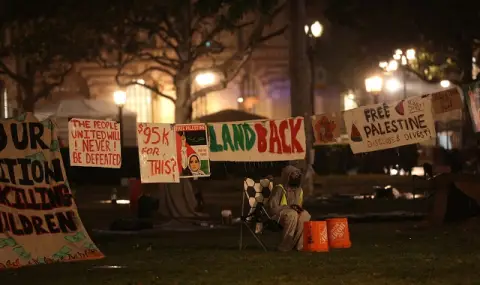Tent camps, clashes and arrests : at several elite American universities, the situation threatens to get out of control. What demands do the students make?
The pro-Palestinian protests, covering more than 30 universities across the country, continue for the third week in the USA. At Columbia University, protesters occupied one of the buildings - Hamilton Hall. There have also been arrests of protesters, which is an unprecedented event for the elite American university.
The entrance to the building was barricaded with metal tables and overturned benches, with protesters on duty to block access. Hamilton Hall houses the faculties of Germanic and Slavic languages. Since its construction in 1907, the largest protests were in 1968 against the war in Vietnam.
„Gaza Strip Solidarity Camp"
The occupation of Hamilton Hall is another escalation in the pro-Palestinian protests. They became active on April 17 after the statement of Columbia University Chancellor Nemat (Minus) Shafiq, who was summoned to Congress. There, Republicans criticized her, accusing her of not doing enough to combat anti-Semitism on campus. Otherwise, the protests began immediately after Israel's response to the large-scale attack by the radical Islamist movement Hamas on October 7, 2023.
A few hours before Shafiq's appearance in Congress, students occupied the lawn in front of the main university library, where they pitched tents and proclaimed a “Gaza Strip Solidarity Camp". The next day, Shafiq, in her own words, took an “extraordinary step" in the “extraordinary circumstances" by authorizing the police to dismantle the tents. During the April 18 action, more than 100 activists were detained. But the very next day, a new tent camp was set up in front of the library.
Mistrust on both sides of the barricades
The protesters made three main demands. First - for the university to abandon investments in companies that - in their opinion - profit from the occupation of the Gaza Strip. Second - to establish full transparency of all Columbia University investments. And thirdly - amnesty for the students and collaborators, disciplinary sanctioned in the course of the protests.
At the beginning of the action, many of the students wanted to draw attention to the deaths of civilians in Gaza. But after Shafiq's decision to resort to the help of the police, discontent shifted to the leadership, and a parallel debate broke out about freedom of speech and the permissible framework of protests. The students perceived the police intervention as an infringement on their rights.
Rabbi Eli Buechler, meanwhile, called on the more than 290 Jewish students at the university to go home amid pro-Palestinian actions. In pro-Palestinian circles, many began to fear "doxing" („doxxing") - disclosing their personal data and violating the principle of confidentiality. The problem escalated after the photos and names of some activists appeared on the LED screens of trucks driving in the university area.
The university's attempts to renew the dialogue
After the police action on April 18, which led to an escalation, the university administration tried to restore the dialogue - with the participation of high-ranking representatives of the academic circles and the University Senate. This independent body, which includes students, alumni and staff of the university, called the request for police intervention “unprecedented and disproportionate", while condemning all manifestations of anti-Semitism, Islamophobia and anti-Palestinian racism.
The university proposed convening a faculty committee to uphold academic freedoms and invest in health care in the Gaza Strip. But there was no breakthrough in the negotiations with the activists.
Pressure on Biden in the run-up to the election
Columbia University is preparing for the graduation ceremony in mid-May. Along with the parents of the graduates, this event traditionally attracts a large number of high-profile guests, including many representatives of the American elite. A possible failure of the ceremony can negatively affect the reputation of the educational institution and lead to a serious outflow of investment.
An additional factor of tension is the upcoming presidential election in November, against the background of which the pressure on Joe Biden is growing in the light of Washington's policy in the Middle East.
The Speaker of the House of Representatives in Congress - Republican Mike Johnson - visited the university on April 24 and said that he will ask the head of the White House to send the National Guard. This threat was not realized. At the same time, Johnson called on Shafiq to resign.
As the “Washington Post" wrote, former President Donald Trump and other Republicans are taking advantage of the outbreak of protests at the country's universities to show that under Biden, “the United States has gone out of control". The president himself, in turn, condemned the occupation of Hamilton Hall, but never visited the university - as Johnson requested.
